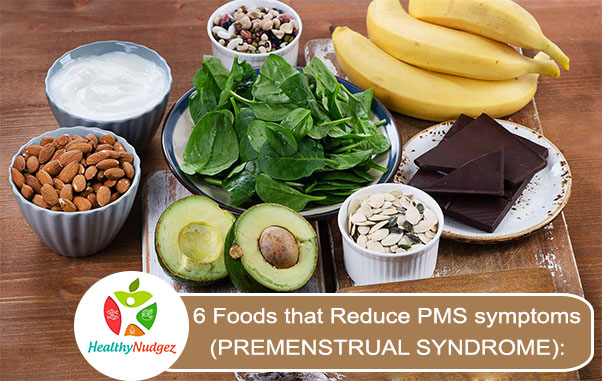6 Foods that Reduce PMS symptoms (Premenstrual Syndrome)
PMS is regular occurrence of physical and psychological symptoms that occurs before menstruation and resolve after menstruation. It affects 20 to 30% premenopausal women. Now a days, due to wrong eating habits and sedentary lifestyle the percentage increased to almost double.
The symptoms usually occurs 5-7 days before onset of menstruation. PMS is related to the production of two female hormones : oestrogen and progesterone , which control menstrual cycle. Fluctuating levels of these hormones cause physical and behavioural changes in the women.
Serotonin, a neurotransmitter also plays an important role in mood swings, irrational behaviour, emotional outburst etc.
Symptoms During PMS:
- Physical symptoms
- Psychological symp
Physical Symptoms includes
- Abdominal bloating
- Constipation
- Head ache
- Food craving (for sweets)
- Breast soreness
- Fatigue
- Tiredness
- Weight gain
- Acne
Psychological Symptoms include
- Sadness
- Mood swings
- Anxiety
- Irritability
- Sleep disorder
- Emotional outburst
- Depression( in some cases)
The high prevalence of PMS and its negative effects on daily routine activities of a woman highlights the need for effective treatment. In PMS, symptoms can be controlled to some extent by dietary manipulation and physical activity. A study had shown that women who do moderate physical activity daily experience less premenstrual symptoms as compared to woman who do hard or less physical activity.
Now coming to dietary manipulation, foods which help to reduce PMS symptoms to certain extent are:
- Whole grains, pulses and legumes: Cereals like oats ,whole wheat, barley, buckwheat, millet contain complex carbs which help to maintain sugar levels, thus reducing symptoms. Legumes like rajma , black chana, whole pulses, sprouts also help to reduce symptoms .
- Nuts and seeds: Nuts like almond, walnut and seeds like pumpkin seeds, contain omega-3 and omega -6 which help to control inflammation, thus reducing the symptoms. Pumpkin seeds contain magnesium which helps to lift your mood and fights water retention.
- Dairy products like cheese , milk, paneer , curd , yogurt are rich sources of calcium and amino acid tryptophan. Tryptophan acts as precursor of serotonin which controls mood swings. Calcium along with vitamin–D helps to reduce symptoms. Ragi , fenugreek leaves, drumstick leaves are also rich sources of calcium.
- Potatoes, sweet potatoes, eggs ,fish ,avocado are vitamin B6 rich foods. Vitamin B6 helps in reducing the psychological symptoms. A study showed that vitamin B6 has role in regulating brain monoamine production which affects our behaviour.
- Evening primrose oil help to reduce symptoms .
- Plenty of fluids should be taken to reduce water retention and abdominal bloating .
Foods to be avoided in order to reduce the symptoms are:
- Cut down the daily salt intake to reduce water retention.
- Avoid oily and spicy foods like pakora, pickles, pappad
- Reduce your caffeine intake of tea, coffee – not more than 1-2 cups per day.
- Cut down simple sugar in form of cakes, pasteries, doughnuts, chocolates,
- Limited alcohol
Free Consultation with : Best Nutritionist in Delhi

